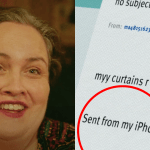
Using a period tracker is a pretty easy way to stay on top of your period cycle, especially if you’re fairly regular and want to learn about how your period impacts your mood and body. However, it turns out fertility apps can be more sinister than they appear, with experts expressing grave concerns about what these apps actually do with your medical data.
The ABC published a report where it interviewed researchers and experts who study fertility apps about the reliability and privacy of period trackers, and turns out they come with quite a lot of risk — some apps literally keep your data forever, even after you’ve deleted your account and the app.
UNSW law researcher Katharine Kemp analysed the privacy settings of the 12 most popular fertility apps used in Australia, including Flo Health and My Calendar, and the findings were dystopian AF. Or, in her words, “concerning, unsafe and unfair”.
There were no completely trustworthy apps, so Kemp’s list was broken up into “apps to avoid”, “apps to approach with caution” and “preferred but not perfect apps”. The list details each app’s privacy policies (or lack of), how it mines and sells your medical data, and whether it then uses this data to target you with specific ads.
She found that, most of the time, privacy messaging was downright misleading and users weren’t given control over how their data was used. I actually just checked the app I have been using for years and yep, after a peruse into the bowels of its random pages, I realised it literally doesn’t have a “privacy settings” options. Fkn yikes.
“Once you have a fertility app sharing health and personal information with advertisers and other data brokers, it can end up in the hands of insurers and other organisations who are in a position to make decisions which could disadvantage someone on the basis of their intimate data,” Dr Kemp told ABC News.
The data partnerships between your app and platforms like Amazon and Google means it’s possible your medical data is being shared with advertisers, which could see these brands prey on your vulnerabilities to market you products. For example: if you’ve been trying to conceive for months and are logging your fertility windows and attempts, this information could be used to show you ads for conception products.
“People can, understandably become quite desperate in those situations, and might be looking for options for different treatments,” Kemp said.
“Potentially, they could be exploited on the basis of that information, and that’s just really wrong.”
On the other side of data sharing, in the US and UK there’s been a growing issue of police requesting period data to convict women of having abortions.
While this isn’t so much a concern in Australia, privacy around your medical data matters — especially with changing political times. Before Roe V Wade was overturned, people probably thought a lot less about their period data. While these issues are unlikely to filter over here, they’re worth noting nonetheless.
Researchers have also theorised that your period data could so be sold to an insurance company affect whether you’re sold life insurance.
“In giving these most intimate aspects of our lives, we are surveilling our own body and allowing others to surveil our body,” Kemp said, per ABC News.
“We might want to think really carefully about whether we do want to do that, and whether the convenience outweighs the potential costs.”
So, how do you keep your period data safe?
Kemp’s advice is, ideally, to ditch using a period tracking app altogether — especially considering studies have found they aren’t very accurate and use outdated health information anyway.
However, if you can’t ditch fertility apps altogether, then perhaps consider moving to a period tracking app that has better privacy options. Make sure your privacy settings are as strict as they can be on the app, and don’t give any information (like your date of birth or family situation) that you don’t have to.
Convenience is important, but so are your personal rights, too.



